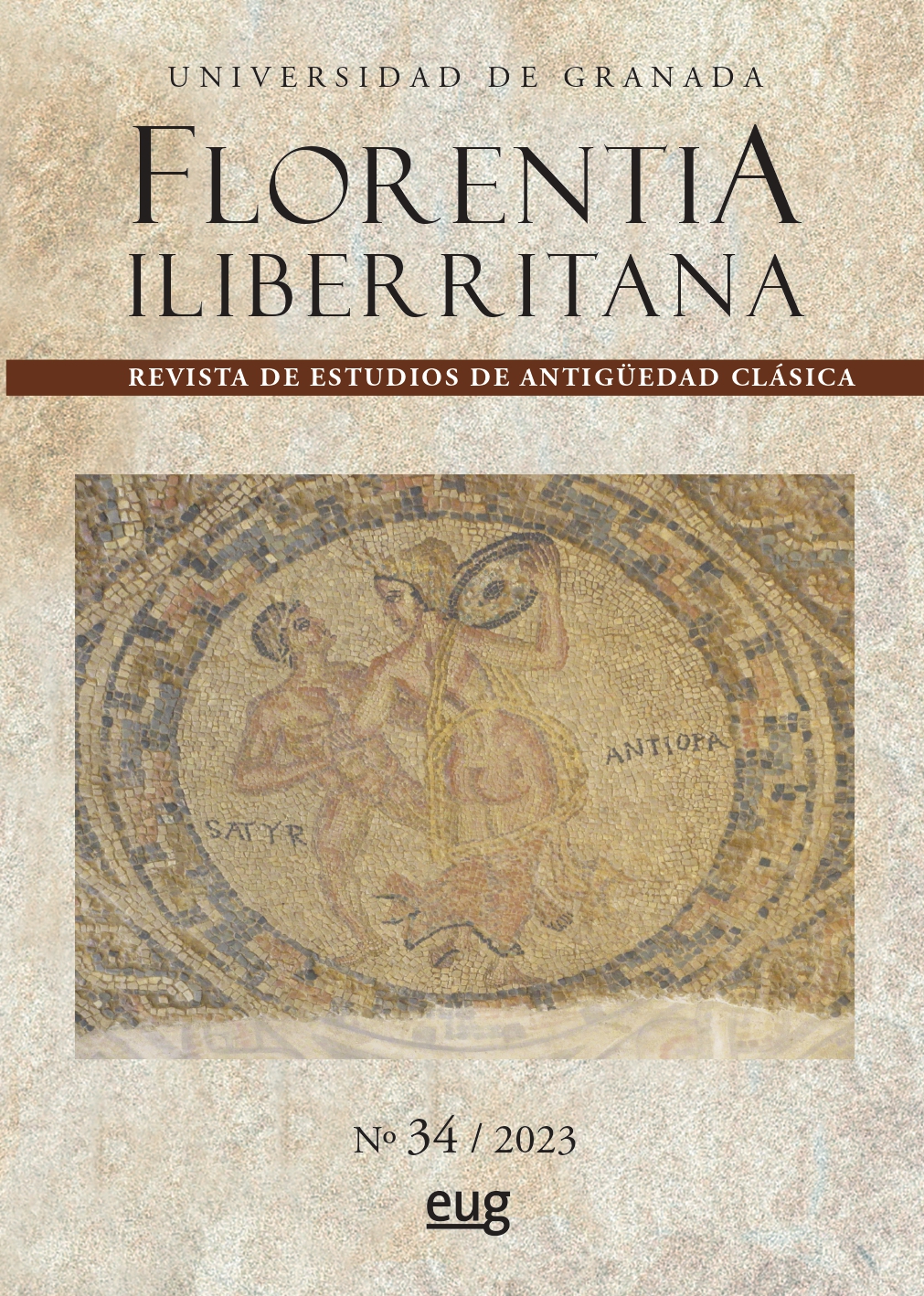Carmina non prius audita: Argumentation Structures and Poetic Language in Horace’s Odes
DOI:
https://doi.org/10.30827/floril.v34.28932Keywords:
Horace, odes, argumentation, logic, stylistics, metreAbstract
The article concentrates upon the relationship between logic and poetry in Horace's odes from the point of view of language and argumentation. At a first level, I examine the extent to which the poet’s linguistic and argumentative techniques agree with the classical structures and strategies of argumentation, but, at a deeper level of analysis, the article aims to show how logic and philosophy intertwine with poetry through stylistics and metre. The study identifies three principal types of argumentative discourse that can be found in the Horatian odes: the demonstration, with its strong (induction) and weak (petitio principii, hasty generalisation) forms, the exhortation, which may be either based upon analogy or accompanied by short explanations, and the contrasting of arguments.
Downloads
References
ADAMS, James Noel (1971), «A Type of Hyperbaton in Latin Prose», Proceedings of the Cambridge Philological Society 197: 1-16. DOI: https://doi.org/10.1017/S1750270500012781
[AUCTORES RHETORICI] Rutilius Lupus, Aquila Romanus, Iulius Rufinianus (1599), De figuris sententiarum et elocutionis. Paris, Ex officina Plantiniana.
CRISTEA, George Bogdan (2022), «Satiris musaque pedestri. Philosophie et causerie à travers la poésie dans les Sermones d’Horace», Latomus 81: 320-351.
DANGEL, Jacqueline (1982), La phrase oratoire chez Tite-Live. Paris, Les Belles Lettres. DOI: https://doi.org/10.3406/igram.1981.2417
D’ANGOUR, Armand (2003), «Drowning by Numbers : Pythagoreanism and Poetry in Horace Odes 1.28», Greece and Rome 50: 206-219. DOI: https://doi.org/10.1093/gr/50.2.206
FISKE, George Converse (1966), Lucilius and Horace: A Study in the Classical Theory of Imitation. Hildesheim, Georg Olms.
LAURAND, Louis (19654), Études sur le style des discours de Cicéron. Avec une esquisse de l’histoire du « cursus ». Amsterdam, Adolf M. Hakkert.
LAUSBERG, Heinrich (1998), Handbook of Literary Rhetoric: A Foundation for Literary Study. Leiden – Boston – Köln, Brill. DOI: https://doi.org/10.1163/9789004663213
LO CASCIO, Vincenzo (1991), Grammatica dell’argomentare. Strategie e strutture. Firenze, La Nuova Italia.
MAROUZEAU, Jules (1922), L’ordre des mots dans la phrase latine. I. Les groupes nominaux. Paris, E. Champion.
NISBET, Robin George Murdoch (1999), «Word Order in Horace’s Odes», in James Noel Adams & Roland Mayer (eds.), Aspects of the Language of Latin Poetry. London, Oxford University Press: 135-154.
NISBET, Robin George Murdoch & HUBBARD, Margaret (1970), A Commentary on Horace: Odes, Book 1. Oxford, Clarendon Press.
NISBET, Robin George Murdoch & HUBBARD, Margaret (1978), A Commentary on Horace: Odes, Book 1I. Oxford, Clarendon Press.
NISBET, Robin George Murdoch & RUDD, Niall (2004), A Commentary on Horace: Odes, Book III. Oxford, Clarendon Press.
NOUGARET, Louis (1963), Traité de métrique latine classique. Paris, Klincksieck.
PERELMAN, Chaïm & OLBRECHTS-TYTÉCA, Lucie (1958), Traité de l’argumentation. La nouvelle rhétorique. Paris, Presses Universitaires de France [réimpr. Bruxelles, 2008].
PINKSTER, Harm (2021), The Oxford Latin Syntax. Volume II. The Complex Sentence and Discourse. Oxford, University Press. DOI: https://doi.org/10.1093/oso/9780199230563.001.0001
POWELL, Jonathan (2013), «Cicero’s Style», in Catherine Steel (ed.), The Cambridge Companion to Cicero. Cambridge, University Press: 41-72. DOI: https://doi.org/10.1017/CCO9781139048750.005
REBOUL, Olivier (1991), Introduction à la rhétorique. Théorie et pratique. Paris, Presses Universitaires de France.
ROMANO, Eliza (1991), Q. Orazio Flacco. Le opere. I. Le odi. Il carme secolare. Gli epodi, tomo secondo. Roma, Libreria dello Stato.
TINDALE, Christopher William (2007), Fallacies and Argument Appraisal. Cambridge, University Press. DOI: https://doi.org/10.1017/CBO9780511806544
TOMA, Alice (2011), «La relation textuelle d’exemplification et l’exemple mathématique», en Victor Ferry, Benoît Sans, Alice Toma (eds.), Études sur l’exemple. Bucarest, Éditions du Musée de la Littérature Roumaine: 49-82.
TOULMIN, Stephen Edelston (1958), The Uses of Argument. Cambridge, University Press. [repr. 2012].
VILLENEUVE, François (1927), Horace. Tome I. Odes et épodes. Paris, Les Belles Lettres.
WALTON, Douglas, REED, Chris & MACAGNO, Fabrizio (2008), Argumentation Schemes. Cambridge, University Press. DOI: https://doi.org/10.1017/CBO9780511802034
WEST, David (2002), Horace, Odes III, Dulce Periculum: Text, Translation and Commentary. Oxford, University Press.
WILKINSON, Lancelot Patrick (1963), Golden Latin Artistry. Cambridge, University Press.
WOODMAN, Anthony John (2022), Horace: Odes, Book III. Cambridge, University Press.
WOOLF, Raphael (2009), «Pleasure and Desire», in James Warren (ed.), The Cambridge Companion to Epicureanism. Cambridge, University Press: 158-178. DOI: https://doi.org/10.1017/CCOL9780521873475.010
ZIMMERMANN, Philippe (2009), Rythme métrique et rythme rhétorique dans la poésie lyrique d’Horace : recherche sur une poétique du sens (thèse de doctorat). Université Rennes 2.
Downloads
Published
How to Cite
Issue
Section
License
Copyright (c) 2024 Florentia Iliberritana

This work is licensed under a Creative Commons Attribution-NonCommercial-ShareAlike 4.0 International License.

















